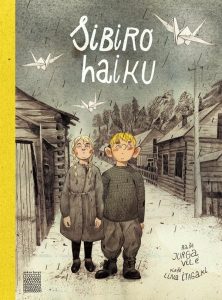Siberian Haiku

Jurga Vilė, Lina Itagaki. Sibiro Haiku (Siberian Haiku), Vilnius: Aukso žuvys, 2017. – 236 p.
Can some stranger really just come into your home, pull you from your warm bed and send you to the far end of the world? This is exactly what happened to hundreds of thousands of Lithuanians who were deported to Siberia during the Soviet occupation. Using an appealing comics format, Vilė tells the story of ten-year-old Algiukas, whose entire family was deported. After a long journey in cattle wagons, it was not easy settling into their new home, which looked nothing like their old cosy and warm house. People were forced to work and endure hunger and cold, all under the watchful eye of armed and often angry guards. Those who couldn’t cope eventually fell silent, forever… Others, like Algiukas, tried to survive and not lose hope, fighting to preserve what is most important in human life. The story is sensitively recounted, in a language that is accessible to children who may have no idea about what happened in Lithuania during the Second World War and why. Illustrator Lina Itagaki creates authentic environments from images preserved in surviving photographs and deportee memoirs. Her innovative graphic novel format, combining imagery and text, resonates with a superior artistic quality: ink and watercolour drawings display a powerful, vibrant colour palette and unity of style.
Wanderer, dreamer, film translator and knitter of thoughts, Jurga Vilė (b. 1977), can split her life into two parts – before and after publishing her first book. She obtained a degree in French philology from Vilnius University, studied visual arts, film archiving and restoration in Paris. She worked as a coordinator of cinema and theatre festivals, and wrote for cultural publications. But her life turned around when her book Sibiro haiku (Siberian Haiku) was published. Having grown up with fragments of stories about exile, inspired by the memories of her father and grandmother, she decided to tell children about what exile is and how people survived it. The topic is not child-friendly or easy for children to understand. Attempting to bring the story closer to young readers, Jurga and the illustrator Lina Itagaki chose a hybrid comic book and epistle genre. The sensitive story of Lithuanian exile, throbbing quietly and smelling of dried apples, has led to hundreds of meetings with readers, book fairs, and festivals in Brussels, Luxembourg, Berlin, Paris, Delhi…
Lina Itagaki (b. 1979) is a graphic artist and translator and teacher of Japanese who lived in Tokyo for six years, where she also completed her university studies. Illustrator’s portfolio: https://linaitagaki.com/
Awards
2018: Best Children’s Book of the Year Prize (Lithuania)
Selected translations
Spanish: Haiku Siberiano. Translated by Jordana Gonzáles-Jonkus. Madrid: Impedimenta, 2023
Estonian: Siberi haiku. Translated by Tiina Kattel. Tallinn: Draakon & Kuu, 2022
Polish: Syberyjskie haiku. Translated by Małgorzata Gierałtowska. Sejny: Fundacja “Pogranicze”, 2022
Czech: Sibiřské haiku. Translated by Vĕra Kociánová. Praha: Argo, 2022
Japanese: シベリアの俳句. Translated by Aya Kimura. Tokyo: Kadensha, 2022
Ukrainian: Сибiрськi Xайку. Translated by Beatričė Beliavciv. Видавництвo, 2021
Russian: Сибирские хайку. Translated by Alexandra Vasilkova. Moscow: Samokat, 2021
Romanian: Haiku Siberian. Translated by Alina Nucă. Voluntari: Editura Frontiera, 2021
German: Sibiro Haiku. Translated by Saskia Drude. Basel: Baobab Books, 2020
English: Siberian Haiku. Translated by Jura Avizienis. London: Self Made Hero, 2020
Latvian: Sibīrijas haiku. Translated by Dace Meiere. Riga: Liels un mazs, 2020
French: Haïkus de Sibérie. Translated by Marielle Viturea. Paris: Sarbacane, 2019
Italian: Haiku Siberiani. Translated by Adriano Cerri. Milano: Topipittori, 2019
Contact for rights: sigita@auksozuvys.lt